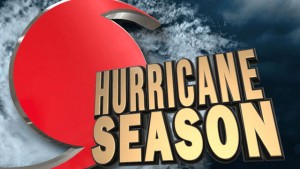 The 2015 Hurricane Season for the Atlantic Basin (North Atlantic Ocean, Caribbean Sea and the Gulf of Mexico) will start officially Monday, June 1 and ends on November 30.
The 2015 Hurricane Season for the Atlantic Basin (North Atlantic Ocean, Caribbean Sea and the Gulf of Mexico) will start officially Monday, June 1 and ends on November 30.
In a release, the Antigua and Barbuda Meteorological Services said it will monitor the development of all systems which threaten the Leeward and British Virgin Islands and if necessary, issue public advisories, watches or warnings through our website: www.antiguamet.com Weather hotline: 463-4638, and other media channels.
“We will also coordinate with disaster management authorities in Antigua and Barbuda, other Leeward Islands and the British Virgin Islands to sensitise the general public to the threats and likely hazards, with the passage of storm systems and the need to monitor and prepare as necessary,” it added.
The names prepared for this 2015 Hurricane Season are: Ana, Bill, Claudette, Danny, Erika, Fred, Grace, Henri, Ida, Joaquin, Kate, Larry, Mindy, Nicholas, Odette, Peter, Rose, Sam, Teresa, Victor and Wanda.
Tropical cyclone activity in the Atlantic basin during the 2014 season was somewhat below average. Of the eight tropical storms that formed, six became hurricanes, and two reached major hurricane strength (category 3 or higher on the Saffir Simpson Hurricane Wind Scale).
In comparison, the 1981-2010 averages are 12 tropical storms, six hurricanes and three major hurricanes.
Bermuda experienced extensive damage from two hurricanes (Fay and Gonzalo) in less than a week’s time in October. Gonzalo, the strongest Atlantic hurricane since Igor in 2010, first affected Antigua and Barbuda and the Leeward islands from October 13.
There were many reports in Antigua and St Maarten/Martin of slight to moderate damage including the loss of roofs, damage to utility infrastructure, broken trees, unsecured properties and boats.
According to agencies, which provide hurricane forecasts, 2015 is expected to be a below-normal season with an average of six to11 named storms, three to six hurricanes and up to two major hurricanes (greater than or equal to category three).
The main reason cited for their predictions is the observance of a strengthening El Nino (warmer than average sea-surface temperatures in the eastern tropical Pacific Ocean and resulting effects) developing during the hurricane season.
It is important to bear in mind that forecasts are by no means exact. The experience of Hurricane Gonzalo last season emphasises the importance of not letting your guard down on the prediction of a quieter season.
Instead, be reminded that it takes only one storm, hurricane or some other weather disturbance to wreak havoc on our small societies. Local authorities and the general public are therefore urged to prepare for a hurricane season and to take necessary precautions as instructed.
Remember, awareness and good preparedness are essential to limiting the loss of life and property this and every hurricane season.
